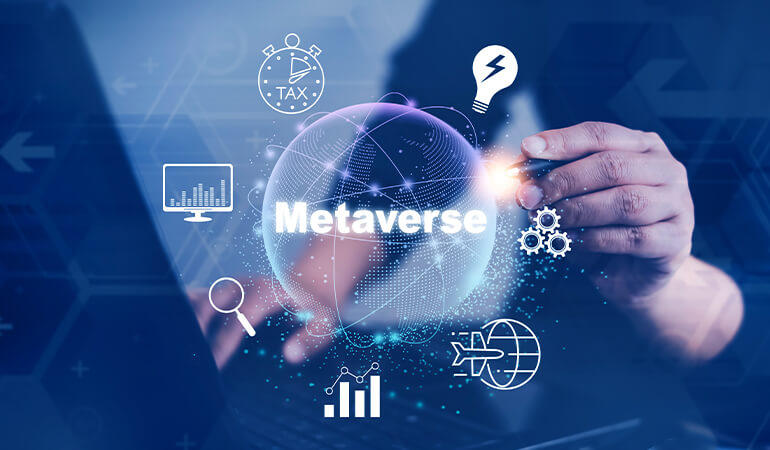
Imagine teleporting to London from New York in just a few clicks to strike a business deal. Or a situation where your digital doppelganger indulges in a digital shopping spree. The metaverse aims to offer such virtual experiences and much more. Many tech industry leaders – from Microsoft’s Satya Nadella to Meta’s Mark Zuckerberg – are doubling down on the metaverse. The metaverse enterprise solutions seem to offer a promising future for businesses worldwide.
The metaverse was only a concept a few years ago, but now it is slowly becoming a reality and coming into its own. The term metaverse was relatively unknown until October 2021, when Facebook decided to change its name to Meta.
Today, we see many companies, like Nike, Gucci, Coca-Cola, H&M, etc., investing heavily in metaverse projects to explore opportunities to increase their market share, tap into new markets, and position themselves for the digital revolution enveloping us.
The fixation with the metaverse is affecting all types and sizes of businesses. But companies considered tech enthusiasts are leading the trend. Organizations are mulling the benefits of the metaverse and how to reap its potential. They also wonder whether to opt for existing metaverse platforms or build their own.
So, let’s dive into the digital worlds of the metaverse to unravel its impact on business and what the future will look like for enterprises. But first, let’s explain what the metaverse is all about, particularly the enterprise metaverse.
What is the Metaverse?
Let’s first shed light on the metaverse.
The term metaverse does not refer to any specific technology. Instead, it refers to a set of technologies, like augmented reality, virtual reality, and artificial intelligence, that come together to create a virtual world. Thus, the metaverse is an immersive virtual digital world that exists alongside the real world.
Think of it as a network of integrated 3D virtual worlds. The term was coined by Neal Stephenson in his 1992 sci-fi novel Snow Crash. You can create digital avatars and interact with other humans on the metaverse pretty much the same way you do in real life – except that it would all be virtual.
Many consider the metaverse to be the successor and future of the internet. Chris Cox, the Chief Product Officer at Meta, calls it the “next chapter, the next evolution of the internet.” He says, “the metaverse is a way of describing the transition into three-dimensional environments.”
What is Enterprise Metaverse?
At its simplest, metaverse enterprise solutions refer to virtual spaces that enable a business to grow by offering its products and services in the digital realm. Enterprise metaverse allows a company to access new markets and increase engagement. It also helps develop purposeful connections, create avenues for leadership, and much more!
Many companies are working to build their own metaverses. Take Decentraland as an example – a metaverse for buying and selling virtual real estate. Or consider Nikeland, Nike’s sports-themed metaverse. Everyone wants a share of the metaverse virtual world, from fashion houses to FMCG companies, from IT to real estate firms.
As of now, enterprise metaverses are in the development process. Slowly but surely, these metaverses will become mainstream commercial avenues for companies. As they evolve, metaverses will enable companies to offer customized value offerings, develop brand differentiation and recognition, and eventually drive revenue and profit growth. It will inevitably lead to the formation of new products, services, and industries.
Let’s delve deeper into the opportunities offered by enterprise metaverse solutions.
Enterprise Metaverse – Opportunities for Businesses
1. Access to Global Audience
For businesses, access to global markets and audiences is probably the most incredible charm of the metaverse. Although the internet has enabled companies to access offshore markets by overcoming geographical boundaries, there still exists a gap between real-life and virtual experiences.
Shopping for clothes online can never fully replace the experience of feeling the fabric in-store, but with custom printed dri-fit shirts, detailed descriptions and performance features like breathability and moisture-wicking help bridge that gap, ensuring customers still make confident, informed choices. Enter the metaverse. It can easily fill this void by providing users with immersive and interactive 3D experiences.
This would empower companies to have a more significant impact on their customers and access far-off markets. Customers from anywhere in the world can walk into your apparel store and shop the way they do in the real world. Thus, the metaverse lets a business offer a customized customer experience that helps build a deeper connection between the customer and the company.
2. Build Deeper Connections
Customer service and retention are the lynchpins of a successful enterprise. Happy customers stay loyal to your brand and help your company grow. Hence companies invest a lot of time and money in improving their customers’ experiences.
Since metaverse tries to mimic the natural world in the virtual realm, it lets your customers connect and communicate with your company on a deeper level. Your company can use the metaverse to track changes in customer demands and requirements in real-time, thus allowing you to adjust your services and products accordingly to provide the best possible experiences.
In other words, the metaverse lets you provide hyper-scalable and fully configurable customer experiences using immersive 3D tools and technologies.
3. Increase Engagement
Metaverse is, in a way, quite similar to all other social media platforms. It is an innovative set of technologies aimed at driving engagement between companies and their customers. The end goal is to offer mutual benefits.
Here are some of the ways the metaverse can increase engagement.
- Use of personalized avatars.
- Real-time customer feedback and communication.
- Ecommerce capabilities.
- Built-in payment features.
- Robust authentication mechanisms to ensure user data security.
- The use of NFTs to offer buying, selling, and trading opportunities.
- A global economy based on blockchain and cryptocurrency.
4. Remote Work Culture
Promoting remote working arrangements is another major impact (and benefit) that the metaverse will have on enterprises. The Covid-19 pandemic has already forced companies to rethink their employee working arrangements.
The transition to working remotely instead of coming to the office is already in place. Zoom and other such platforms have allowed us to work remotely from the confines of our homes. But then again, it lacks the personalized and real-world experience the metaverse offers.
In the future, companies will be able to create their own virtual workplaces where employees can participate in board meetings, attend brainstorming sessions, and create virtual presentations. These virtual workplaces will be more than just virtual get-togethers; they will be highly interactive and engaging. Thus, work culture in the metaverse will be streamlined, benefiting both the employer and the employee.
Moreover, the metaverse will remove all sorts of physical constraints and boundaries. Companies will be able to hire from around the globe without worrying about employees’ travel costs or the costs of having a brick-and-mortar office.
5. Content Development and Distribution
Content development and distribution are going to change entirely in the metaverse enterprise solutions. No longer will content remain confined to videos and images, GIFs, and audio – everything will become – in a sense – more real and more engaging.
It will also lead to the democratization of content and push companies to come up with new ways to develop and distribute content.
6. Employee Training and Development
The use of technologies like augmented reality, virtual reality, and AI is already revolutionizing the processes of employee training. E-learning and training are now a reality. But when these technologies come together in the metaverse, they will completely change how companies approach their employees’ training and career development.
7. Digital Assets
Once the metaverse enterprise solutions become mainstream, they will create a global marketplace and economy of their own. Companies would become a part of this global economy without caring about geographical boundaries. Imagine a virtual stock exchange in the metaverse. It would have a broader investor base, and companies worldwide could trade their shares on it.
Blockchain and cryptocurrencies will provide financial security as transactions in the metaverse will be secure. Thus, individuals and companies could trade automobiles, artworks, real estate, and other digital assets using non-fungible tokens (NFTs).
Wrap-Up
The metaverse in business surely offers exciting new opportunities for enterprises. It would enable companies to hyper-scale their operations and access a global audience in three-dimensional virtual worlds.
But as with all innovative and disruptive technologies, the metaverse will also pose serious challenges. There are concerns about the absence of regulation and the chances of spreading hate, violence, and disinformation on the metaverse.
Nevertheless, these challenges do not outnumber the opportunities and benefits offered by the metaverse. When the time comes, we will find a way to overcome these challenges and chart a new path for ourselves that is tech-driven, inclusive, and beneficial to all.
